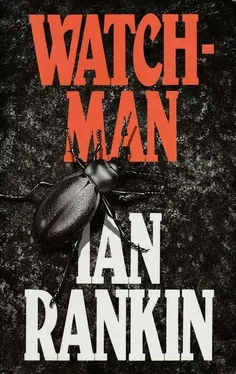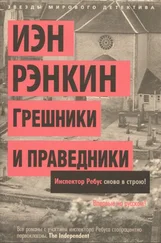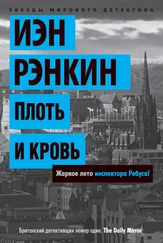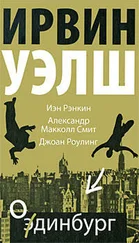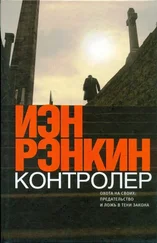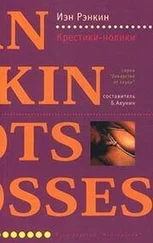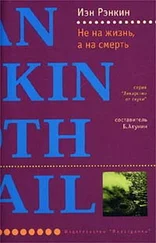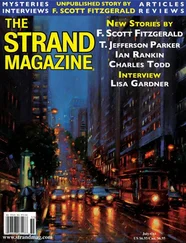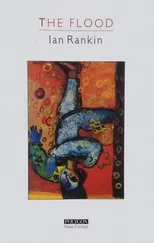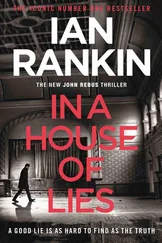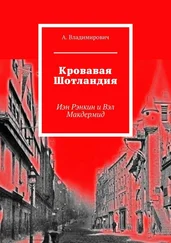‘My assistant,’ said Stevens.
Miles recognized the woman who had been watching his house.
‘Put your hands down, Mr. Stevens. I’ll put this away. It wasn’t for your benefit, rest assured.’
Miles slipped the gun back into his pocket, and Stevens lowered his arms.
‘I want to ask you a few questions about—’
‘No need,’ interrupted Miles. ‘I’ve sent a tape recording to your newspaper office. It should make everything clear.’
‘But I don’t work there anymore.’
‘You don’t what?’ This from Janine, who had taken her hands from her pockets and now stood with them planted firmly on her hips.
‘This is Mr. Collins, by the way,’ said Miles. ‘His is one of the voices on the tape.’ Collins smiled toward Janine, who smiled back at him, her eyes showing interest.
‘By the way, how did you find us?’ asked Miles, resting against the parapet.
‘Oh, I’ve still got friends here. I worked here for years. A wise newspaperman gets to know the hotel clerks, the night porters. And then I thought, well, you’re the boardinghouse type, quiet, anonymous, but you’re playing some sort of game, so you’d go for the opposite, try to outmaneuver anyone who might be looking for you.’
Collins gave Miles a contemptuous look. Miles knew what he was thinking: if this man can outwit us, others can too.
‘Oh, and I’m not the only person looking for you.’
‘What?’
‘And what’s your first name, Mr. Collins?’ Janine was asking.
‘William.’
‘What do you mean,’ said Miles, ‘someone else is looking for me?’
‘That’s right,’ said Stevens, part of his attention lost to the dialogue going on between Janine and Collins.
‘Yes?’ prompted Miles.
‘Well, according to the hotel clerk I spoke to, someone else has been asking questions, flashing around a bit of cash. Only they didn’t have my sources.’
‘Any idea who?’
‘No.’
‘It looks to me,’ said Collins, ‘as though that snake Monmouth’s been blabbering.’
‘Who’s Monmouth?’ asked Stevens, nose twitching. Janine had started to point out local landmarks to Collins.
‘The other man on the tape,’ said Miles.
‘And this tape will answer all my questions?’
‘Oh yes, definitely.’ Miles was examining the parapet. ‘Long way down, isn’t it?’
‘Very.’
‘I love your accent,’ Janine was telling Collins. ‘Irish accents make me all shivery.’
‘Yes, it is a bit chilly up here,’ Stevens called to her, and she stuck out her tongue at him. ‘Look, why don’t we all go for a drink, eh? I know a pub near the station—’
‘Sorry, we have work to do.’
‘Well, later maybe. Or tomorrow?’
‘OK,’ said Miles. ‘Tomorrow afternoon.’
‘Fine.’ Stevens was smiling. He knew when someone was selling him Korean tartan. ‘Do you know the Sutherland Bar?’
‘I used to drink there as a student.’
‘Well, that’s fixed then. Janine, let’s go. I want to phone London and get someone to send me this mysterious tape.’
But Janine and Collins were busy in conversation, their voices muted. They seemed not to have heard Stevens, who, beginning to blush, turned back to Miles Flint and returned his grin. ‘Well,’ he said, ‘she can catch me up.’ He made toward the stairwell. ‘Oh, and Mr. Flint?’
‘Yes?’
‘I hope you have a permit for that gun.’
Waverley Station, lying under glass and metal, had changed much since his last visit. It had become fashionably and garishly open-plan, with a taped skirl of maltreated bagpipes and a bevy of high-profile station staff ready to answer the traveler’s every question. The flooring reminded him of some dappled ice-rink surface, and video screens everywhere informed passengers that all trains were running upward of five minutes late due to a local dispute.
By the look of things, the early morning commuter rush had just ended. Taxi drivers were catching up on the day’s news headlines, their beefy arms resting against warm steering wheels. The station was lit, the day being dark, a real hyperborean landscape. The glare of the interior was igloo-like, while the ramps leading up to Waverley Bridge were like boltholes to the surface of the world.
There was little hurry here, the people moving at a winter’s pace, retaining their energy. There were no tourists to deal with, only some business travelers and people coming into the city for a day’s shopping. Although a public place, it was openly private in its attitude. It would do nicely. He signaled to his companions.
‘You know what to do?’
‘Yes, Mr. Partridge,’ said Jeff Phillips.
Billy Monmouth had told Partridge all he had needed to know. He had said that Flint was planning a nasty little surprise. He had said that Flint was not coming in alone, but had Collins with him. These revelations had made the logistics nice and easy. It didn’t matter so much about Flint himself. For the moment, Partridge really wanted only the Irishman, for he was the last piece of evidence. He felt the absurdity of it all. At first it had seemed so simple and so viable, but when one killed someone, a whole chain of events came into being which grew and grew and would not stop growing, leaving everyone powerless and trapped within the chain. He couldn’t break that chain now if he wanted to. He wasn’t coming empty-handed to meet Flint. He had a good enough proposition to put to him, one which Flint was certain to accept. They would play it like an honest game of cards between two players who know each other for incorrigible cheats.
He had questioned Billy Monmouth thoroughly. Did Flint have any other evidence? No transcripts? No signed statements? Billy had been very definite in his answers, and it seemed that Flint had slipped up here: he had thought Collins such a strong trump that he had dispensed with any alternatives or backups. That was foolish of him. Billy had said that he was a changed man, that the incident in Ireland had unhinged him. He was uncoordinated, rambling, half living in a fantasy world of Berlin Wall shootouts and car chases. There would be none of that today.
Partridge felt himself prepared for any scheme Flint might throw at him. Slowly, with Phillips and the woman a few yards behind him, he made his way across the concourse toward platform 17.
He wished that he had taken the opportunity on the train to wash himself and maybe even shave. It had been an appalling journey, and the more frustrated he had become, the slower the train had moved, until it had seemed that everything was standing still and that he was moving forward by himself, was running, having broken free of his chains.
He walked to the end of platform 17, his hands by his side, intimating that he was not in possession of any kind of weapon. In fact, he was carrying a small revolver in his jacket pocket. To combat the cold, however, he wore an overcoat, and the gun, buried beneath this coat, was for use only in the direst emergency. He didn’t believe he would have any need of it.
There were no train spotters about. The end of the platform did not offer overhead shelter from the morning’s needle-fine drizzle, and he turned up his coat collar. The trains that arrived at this platform were local services from Dundee and Fife, no farther. He saw from the flickering video screen that a train was due in from Cowdenbeath. Now where on earth was that? He seemed to recall that a football team from there appeared somewhere in the Scottish league, but couldn’t be sure. Looking back up the length of the platform, he saw Phillips standing with the woman, who was held in toward him as though unwillingly. He motioned for Phillips to move farther away. It would ruin everything if Flint were to see them both. Phillips moved away quickly, right out of Partridge’s sight. He would reappear when the time was right.
Читать дальше
